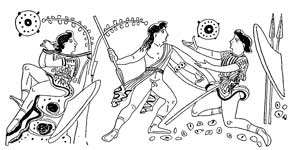.
In Greek mythology, Lycaon (/laɪˈkeɪɒn/; Ancient Greek: Λυκάων) was the name of the following personages:
Lycaon or Lycon, son of the giant Aezeius, one of the first Peloponnesian kings, by a nymph. He was the father of Deianira, mother of the impious Lycaon below.[1][2]
Jupiter and Lycaon, Jan Cossiers
Lycaon, king of Arcadia and son of Pelasgus. He is the Lycaon who tried to feed Zeus human flesh; in some myths he is turned into a wolf as a result. [3]
Lycaon, son of Ares and possibly Pelopia[4] or Pyrene,[5] and thus, the brother of Cycnus. Like his brother, he was also killed by Heracles in one of his adventures.[6]
Lycaon, also called Lycus, son of Poseidon and the Pleiad Celaeno. He was the brother of King Eurypylus of Cyrene.[7]
Lycaon, son of the above Eurypylus and Sterope, daughter of Helios, and thus, brother of Leucippus.[8][9]

Lycaon, a Trojan prince and son of Priam and Laothoe.[10] He lent his cuirass to Paris when he duelled against Menelaus. On another occasion Apollo took the shape of Lycaon to address Aeneas. During the third year of the war, Lycaon was captured and eventually killed by Achilles.[11]
Lycaon, one of the comrades of the Greek hero Odysseus.[12] When the latter and 12 of his crew came into the port of Sicily, the Cyclops Polyphemus seized and confined them. Along with the Ithacan king and six others namely: Amphialos, Alkimos, Amphidamas, Antilochus and Eurylochos, Lycaon survived the manslaughter of his six companions by the monster.[13]
Lycaon, father of Pandarus and Eurytion, a companion of Aeneas in Italy. He was a resident of Zeleia in Lycia and together with his son, Lycaon responded to the call of King Priam in Troy when the city was attacked by a large army of the Greeks.[14]
Lycaon of Gnossos, one who fashioned the sword that Ascanius, son of Aeneas, gave to Euryalus.[15]
Lycaon, father of Erichaetes, one of the soldiers of Aeneas in Italy.[16]
Notes
Dionysius of Halicarnassus, Antiquitates Romanae 1.11.2
Greek Papyri III No. 140b
Apollodorus, 3.8.1
Apollodorus, 2.7.7
Apollodorus, 2.5.1
Euripides, Alcestis 502 ff.
Scholia on Apollonius Rhodius, 4.1561, referring to Philarchus for the alternate names
Tzetzes on Lycophron, 886
Scholia on Pindar,Pythian Ode 4.57
Apollodorus, 3.12.5
Apollodorus, Epitome 3.34 ff
Tzetzes, John (2019). Allegories of the Odyssey. Translated by Goldwyn, Adam J.; Kokkini, Dimitra. Harvard University Press, Cambridge, Massachusetts, London, England: Dumbarton Oaks Medieval Library. pp. 141, 9.141. ISBN 978-0-674-23837-4.
Tzetzes, John (2019). Allegories of the Odyssey. Translated by Goldwyn, Adam J.; Kokkini, Dimitra. Harvard University Press, Cambridge, Massachusetts, London, England: Dumbarton Oaks Medieval Library. pp. 141, 9.135–140. ISBN 978-0-674-23837-4.
Virgil, Aeneid 5.495
Virgil, Aeneid 9.304
Virgil, Aeneid 10.749
References
Apollodorus, The Library with an English Translation by Sir James George Frazer, F.B.A., F.R.S. in 2 Volumes, Cambridge, MA, Harvard University Press; London, William Heinemann Ltd. 1921. ISBN 0-674-99135-4. Online version at the Perseus Digital Library. Greek text available from the same website.
Dionysus of Halicarnassus, Roman Antiquities. English translation by Earnest Cary in the Loeb Classical Library, 7 volumes. Harvard University Press, 1937–1950. Online version at Bill Thayer's Web Site
Dionysius of Halicarnassus, Antiquitatum Romanarum quae supersunt, Vol I-IV. . Karl Jacoby. In Aedibus B.G. Teubneri. Leipzig. 1885. Greek text available at the Perseus Digital Library.
Publius Vergilius Maro, Aeneid. Theodore C. Williams. trans. Boston. Houghton Mifflin Co. 1910. Online version at the Perseus Digital Library.
Publius Vergilius Maro, Bucolics, Aeneid, and Georgics. J. B. Greenough. Boston. Ginn & Co. 1900. Latin text available at the Perseus Digital Library.
Tzetzes, John, Allegories of the Odyssey translated by Goldwyn, Adam J. and Kokkini, Dimitra. Dumbarton Oaks Medieval Library, Harvard University Press, 2015. ISBN 978-0-674-96785-4
| Ancient Greece
Science, Technology , Medicine , Warfare, , Biographies , Life , Cities/Places/Maps , Arts , Literature , Philosophy ,Olympics, Mythology , History , Images Medieval Greece / Byzantine Empire Science, Technology, Arts, , Warfare , Literature, Biographies, Icons, History Modern Greece Cities, Islands, Regions, Fauna/Flora ,Biographies , History , Warfare, Science/Technology, Literature, Music , Arts , Film/Actors , Sport , Fashion --- |
Retrieved from "http://en.wikipedia.org"
All text is available under the terms of the GNU Free Documentation License


